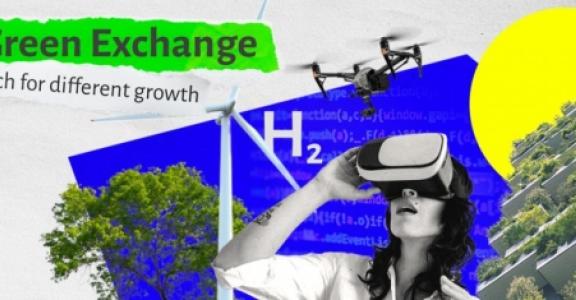What role can technology and innovation play in the transition to a low-carbon society and green economy? We present to you nine 'Green Champions' definitely worth knowing!
At The Green Exchange, the annual event by Sirris and Agoria at BluePoint Brussels on 25 May, there will be plenty of inspiration on the green transition to be found. One of the items on the programme is "Meet the Green Champions", where you can meet a selection of technology companies that are helping to shape the sustainable transition in various domains and who, like you, believe in the power of innovation.
These companies were carefully selected by a board of Agoria and Sirris experts. At the event, you will be able to speak to these Green Champions in person and exchange thoughts on their experiences. As a foretaste, here is a brief explanation by Francis De Meyere, Head of Research at Agoria, of why these companies absolutely belong among the 'Green Champions' in our sector:
1. Sustainable mobility
VDL Bus & Coach (Roeselare) responds to the challenges of public transport today and tomorrow. While in recent years 'Aiming for Zero' was the ambition, the new motto has is now 'zero compromise'. It is a reference both to zero emissions and to the fact that with the new generation of Citea buses no compromises have to be made in order to achieve the zero-emission targets. The new Citea range meets every existing market demand: every model offers a solution without compromise when it comes to sustainability, passenger comfort and capacity, ergonomics, range, safety and, as a result, total cost of ownership (CTO). In addition, VDL Groep is investing in a new, energy-neutral factory in Roeselare to build these new buses in a sustainable manner.
For more information, please visit: https://www.vdlbuscoach.com/en
2. Home control ecosystem
Niko (Sint-Niklaas) has connected power sockets with a built-in consumption measurement feature that can be switched on and off remotely via an application. Thanks to the ever-expanding Niko Home Control ecosystem, Niko and its partners also give users instant access to and total control over everything in and around the house. From energy consumption to energy production, through lighting, heating, air conditioning, ventilation, solar panels, skylights, blinds, alarm systems, doors, windows and much more - applications that can significantly reduce energy consumption in (residential) buildings.
For more information, please visit: https://www.niko.eu/en
3. Waste to energy
Today, mankind produces about 2 billion tonnes of municipal solid waste per year, and about 70% of that waste is still dumped, often in an uncontrolled way. Landfilling has dramatic consequences for both our quality of life and our environment: for example, climate change, spread of diseases, spread of plastics, water and soil pollution, air pollution and permanent loss of the materials that are landfilled. Waste reduction and recycling are top priorities, but non-recyclable waste, such as composite materials, contaminated materials and materials that cannot be recycled, also needs to be dealt with. Waste-to-Energy and the SIGMATRIX technologies of Keppel Seghers (Willebroek) offer that solution: they divert non-recyclable waste from landfills and generate clean energy and recyclable materials, such as ferrous and non-ferrous metals and minerals from non-recyclable waste. Keppel Seghers has been active for over 45 years with more than 100 Waste-to-Energy projects in over 20 countries, diverting the waste of 65 million people from landfills every day.
For more information, please visit: https://www.keppelseghers.com/
4. Saving energy in railway transport
Trains are among the most environmentally friendly means of transportation. Alstom (Bruges - Brussels - Charleroi) contributes to this with innovative solutions such as the development of hydrogen or battery-powered trains, which are replacing diesel trains. The Belgian teams are also pioneers in autonomous trains with innovative digital solutions. This technology focuses on speed optimisation and energy savings. The solutions vastly contribute to the development of carbon-free mobility.
For more information, please visit: https://www.alstom.com/
5. Digitalisation of the power grid
For Haulogy (Ronquières, Braine-le-Comte) the digitisation of the electricity grid and the switch from one-way to two-way flows of energy and data are essential steps to facilitate the integration of decentralised generation, such as solar and wind power, into the grid. As a software company, Haulogy offers a service in which three disciplines intersect: software engineering, knowledge of the energy markets and skills in artificial intelligence. The combination of these three gives Haulogy the ability to support energy players in their digital transformation and in the design of new services.
For more information, please visit: https://haulogy.net/
6. Data management in the energy and water sector
Monitoring and tracking the human impact on the environment are essential in the green transition. Digital technologies will play an important role in this. Opinum (Mont-Saint-Guibert) has made this its core business. The company markets data management solutions for applications in the energy and water sectors. These solutions make it possible to monitor the human impact on the environment, detect inefficient use of natural resources, optimise energy distribution processes and help people better understand their consumption.
For more information, please visit: https://www.opinum.com/
7. Mobility for all
Through its "Beyond Zero" statement and continuous innovations such as the recently-started production of fuel cell modules in Belgium, Toyota Motor Europe (Evere) is strongly committed to making improvements in the fields of the climate, carbon neutrality and inclusiveness. The company is also looking beyond cars and wants to become a provider of inclusive and sustainable 'Mobility for All', for a better world in the future. Toyota is also working on an offer of Mobility-as-a-Service (MaaS).
For more information, please visit: https://www.toyota-europe.com/
8. Blockchain technoloqy in water solutions
The Track and Trust digital ledger technology developed by the Fujitsu Blockchain Innovation Center (Anderlecht) ensures that all stakeholders see the same verifiable data almost in real time, while eliminating friction and delays in supply chains and ecosystems. The blockchain solution enables a safe and secure water trading system, providing up to 3 trillion litres of new clean drinking water annually. The new platform addresses the global water scarcity faced by nearly two-thirds of the world's population and strives for sustainable, circular water use. In addition, participants can donate potable water to philanthropic projects, which will help organisations achieve their ESG goals.
For more information, please visit: https://www.fujitsu.com/be/microsite/blockchain/
9. Predictive building technology
DeltaQ (Brussels) combines data and artificial intelligence to optimise building management and better align it with user needs. DeltaQ's self-learning algorithms learn how a building behaves under varying internal and weather conditions. DeltaQ continuously maximises energy cost savings and ensures optimal comfort.
For more information, please visit: https://deltaq.io/


